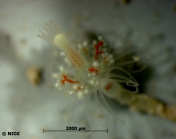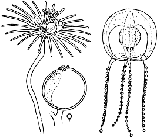RAS taxon details
Tubulariidae Goldfuss, 1818
1603 (urn:lsid:marinespecies.org:taxname:1603)
accepted
Family
Tubulariida · unaccepted (unfounded grouping)
- Genus Ectopleura L. Agassiz, 1862
- Genus Hybocodon L. Agassiz, 1860
- Genus Tubularia Linnaeus, 1758
- Genus Zyzzyzus Stechow, 1921
marine, brackish, fresh, terrestrial
Goldfuss, G.A., 1818. Ueber die Classification der Zoophyten. Isis, 1818 : 1008-1013.
page(s): 1010 [details]
(of ) Goldfuss, G.A., 1818. Ueber die Classification der Zoophyten. Isis, 1818 : 1008-1013.
page(s): 1010 [details]
page(s): 1010 [details]
(of ) Goldfuss, G.A., 1818. Ueber die Classification der Zoophyten. Isis, 1818 : 1008-1013.
page(s): 1010 [details]
RAS (2025). Tubulariidae Goldfuss, 1818. Accessed at: https://ras.biodiversity.aq/aphia.php/www.pfeil-verlag.de/04biol/aphia.php?p=taxdetails&id=1603 on 2025-09-13
RAS (Eds.) (2025). Register of Antarctic Species. Tubulariidae Goldfuss, 1818. Accessed at: https://ras.biodiversity.aq/aphia.php?p=taxdetails&id=1603 on 2025-09-13
Date
action
by
2004-12-21 15:54:05Z
created
db_admin
original description
Goldfuss, G.A., 1818. Ueber die Classification der Zoophyten. Isis, 1818 : 1008-1013.
page(s): 1010 [details]
original description (of ) Goldfuss, G.A., 1818. Ueber die Classification der Zoophyten. Isis, 1818 : 1008-1013.
page(s): 1010 [details]
basis of record Bouillon, J.; Boero, F. (2000). Synopsis of the families and genera of the Hydromedusae of the world, with a list of the worldwide species. <i>Thalassia Salent. 24</i>: 47-296 (look up in IMIS) [details]
page(s): 1010 [details]
original description (of ) Goldfuss, G.A., 1818. Ueber die Classification der Zoophyten. Isis, 1818 : 1008-1013.
page(s): 1010 [details]
basis of record Bouillon, J.; Boero, F. (2000). Synopsis of the families and genera of the Hydromedusae of the world, with a list of the worldwide species. <i>Thalassia Salent. 24</i>: 47-296 (look up in IMIS) [details]
 Present
Present  Inaccurate
Inaccurate  Introduced: alien
Introduced: alien  Containing type locality
Containing type locality

